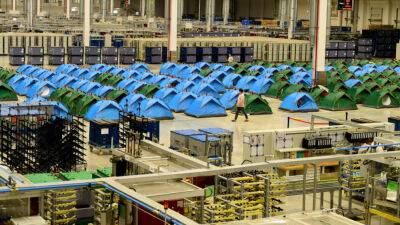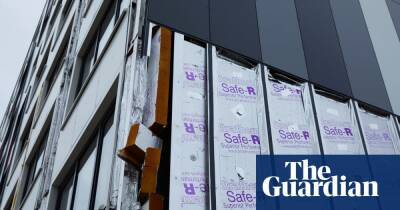Michael Gove needs to cast ‘polluters pay’ net further in cladding crisis
A request works best when backed by menaces. The housing secretary, Michael Gove, seems to be close to getting much of what he wants from stage one of his operation to raise serious sums to fix the cladding and fire-safety crisis that was appallingly highlighted by the Grenfell Tower disaster of 2017.
Fifty-three developers were invited, on pain of being cut out of planning approvals, to sign a building safety pledge that commits them to fund the costs of remediation work on all medium- and high-rise buildings they have built over the past 30 years. The number of corporate holdouts is likely to be in low single digits.
Barratt Developments was the latest big name to sign on Wednesday, making a provision of £350m to £400m, even though, as it said, cladding and wall systems were signed off as compliant at the time. Persimmon, Taylor Wimpey, Berkeley, Crest Nicholson, Redrow, Gleeson and more are also on board.
The pledge-signers have also promised not to make claims on the £5bn building safety fund that will remediate buildings taller than 18 metres. Since the cash for that fund will be raised in part by a 4% levy on residential developers’ profits for the next 10 years, you can understand why a few executives grumble about paying twice. Well, yes, but that’s politics. Gove’s “polluter pays” exercise was a welcome relief after predecessor Robert Jenrick’s grotesque attempt to load costs on to leaseholders.
Equally, however, there must come a point at which the remaining bill has to be spread more widely. This is the tricky stage at which Gove has arrived: how to fund work on so-called “orphan” buildings of 11 to 18 metres that were built by foreign firms or firms that have subsequently gone bust. The tally will also include
Read more on theguardian.com


![Will Solana [SOL] be able to repair investors’ confidence in May - ambcrypto.com](https://finance-news.co/storage/thumbs_400/img/2022/5/5/24352_qf4gi.jpg)
![What are the chances of Bitcoin [BTC] retesting $42k in near-term - ambcrypto.com](https://finance-news.co/storage/thumbs_400/img/2022/5/5/24351_oe9r.jpg)


![Zilliqa [ZIL] investors must watch out for these key levels - ambcrypto.com](https://finance-news.co/storage/thumbs_400/img/2022/5/5/24346_7ivax.jpg)





![IOTA [MIOTA] comes to Panama and here’s how the metrics reacted - ambcrypto.com - city Santiment - Panama - city Santimenthowever - city Santimentthis - city Santimentnext](https://finance-news.co/storage/thumbs_400/img/2022/5/5/24340_ejq.jpg)





